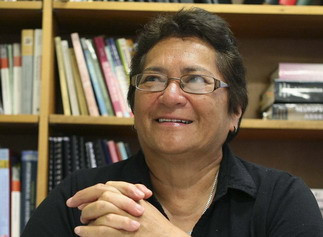Clinical psychologist Dr Margaret Dudley (Te Rarawa, Te Aupōuri and Ngāti Kahu) has received one of New Zealand’s top Māori health research fellowships to help improve rehabilitation outcomes for Māori following a stroke or head injury.
Dr Dudley, who is based at AUT University, has been a clinical psychologist for 14 years, specialising in the area of neuropsychology. She will use the $375,234 Māori Health Research Postdoctoral Fellowship from the Health Research Council of New Zealand (HRC) to develop Māori-focused standards for thinking/cognitive performance.
Māori have a high incidence of traumatic brain injury – almost three times the rate of any other ethnic group in New Zealand – and also experience strokes at an average age of 61 compared with 75 for Pākehā.
Currently, Dr Dudley says most tests that neuropsychologists use to assess people with a neurological disorder have been developed in the USA or UK, and don’t reflect a Māori worldview. “The kaupapa of this research is to obtain information for a commonly-used neuropsychological measure that is representative of Māori”, says Dr Dudley.
Including Dr Dudley’s fellowship, the HRC has awarded a total of $1,248,082 to help Māori health researchers develop their careers and improve health outcomes for Māori.
Monica Koia (Ngāti Porou, Ngāti Kahungunu, Ngāti Raukawa ki te Tonga, Te Arawa) has received a Māori Health Research PhD Scholarship worth $110,050 to investigate Māori health cancer workforce initiatives, specifically, the development of Māori cancer coordinator or navigator roles. Ms Koia has worked in the social service sector for 15 years, and is currently employed at the Research Centre for Māori Health and Development at Massey University.
“The Māori cancer navigator positions are a recent initiative in Aotearoa, and little is known about the model and its impact on reducing disparities in health. I’m proposing to investigate these gaps within the Central Cancer Network,” says Ms Koia.
Practice nurse Maraea Nathan (Ngāti Raukawa ki te Tonga, Ngāti Whātua/Ngāpuhi) plans to use her $12,000 Rangahau Hauora Award to explore how health providers support Māori whānau to understand and manage tamariki asthma. Ms Nathan will enrol in a postgraduate public health course at the University of Otago, Wellington, to aid in her research.
“I embrace the opportunity to further extend my skills in the hope that we can improve the effectiveness of our services… and ensure our community receives the highest quality health care and services that are responsive to the needs of whānau,” says Ms Nathan.
The HRC’s Chief Executive, Dr Robin Olds, says he and the assessing committees were very impressed by the high quality of applications for this year’s awards.
“Fostering the Māori health research workforce through the career development award programme is strongly aligned with our mission. The programme continues to attract Māori health researchers at all levels of career development. We were particularly impressed by the number of postdoctoral and PhD applications received.”
For the full list of award recipients, go to the research repository.
